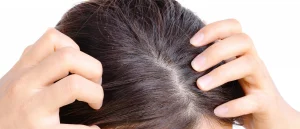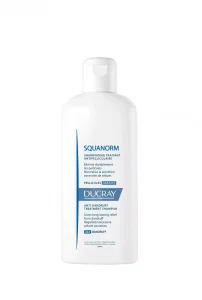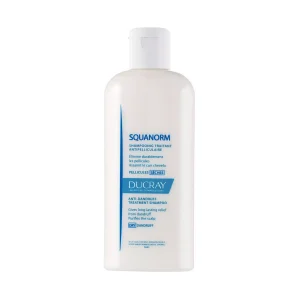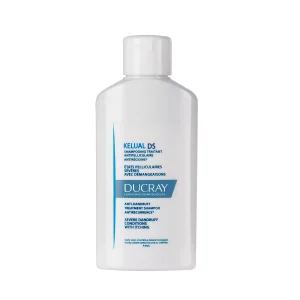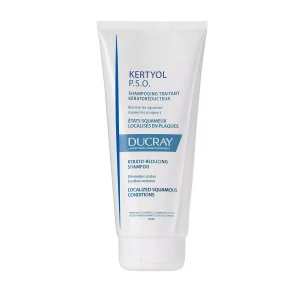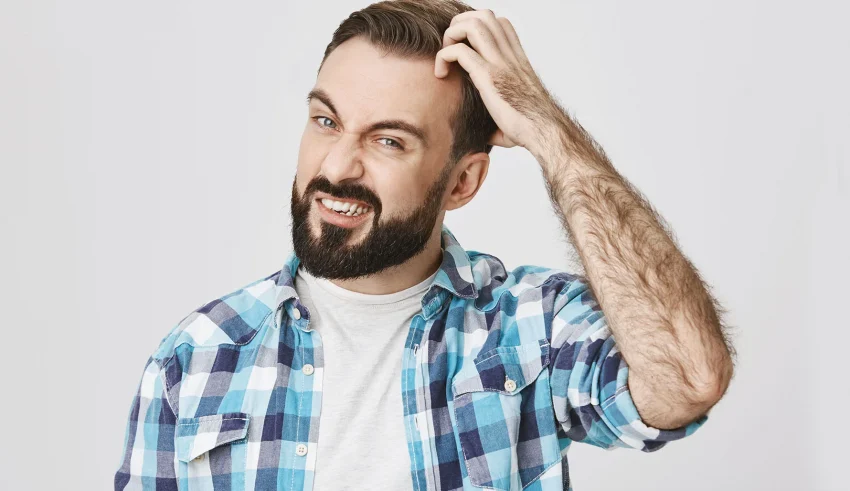
Dandruff is a common problem that many people face. It can cause flakes on the scalp, which build up and then fall off. If you have an itchy scalp and dandruff in your hair, you need to look for the best dandruff shampoo. Let’s learn about dandruff in this article from The Dermo Lab with the dermatologist Dr. Maria Bou Sleiman.
What are the most common symptoms of dandruff?
Flaking is the most visible sign of dandruff and you can see it on your hair and also on your shoulders. This occurs when the body increases the rate of skin cell turnover, resulting in excess cells on the scalp and dandruff.
Although this is the most visible sign, it is not always the first. Itching is often the first symptom you may experience and can serve as a warning sign before dandruff appears. Dryness and redness may also appear early and give a feeling of tightness to the scalp. Dr. Maria Bou Sleiman states that the signs and symptoms can be more severe if you are stressed, and they tend to get worse during cold, dry seasons.
Dr. Maria Bou Sleiman notes that some children are born with dandruff, which is called cradle cap. However, it most often begins at puberty, when hormones lead to increased sebum production, and peaks around age 20, and continues into adulthood.
What are the most common misconceptions about dandruff?
1- You can have dandruff on your face and body too.
Dandruff isn’t necessarily limited to your scalp. It’s not uncommon for women to discover dandruff in their eyebrows, around their ears, and on the sides of their noses – anywhere where a lot of oil is produced. Usually, these flaky patches occur alongside a flaky scalp. If you have these extra spots, use your dandruff shampoo to gently clean them when you wash your hair.
2- You should wash your hair more often.
Some people advise against washing your hair every day, as they fear it will strip your scalp and hair of their natural oils and cause irritation. Dandruff is the opposite problem. If you don’t shampoo enough, your dandruff condition will only get worse. This is because it causes a buildup of sebum and dead skin cells on your scalp, which yeast and fungi continue to feed on.
Dr. Maria Bou Sleiman points out that shampooing should be done daily to remove excess sebum. If the case is mild, you can use medicated shampoos 2 to 3 times a week and alternate with regular shampoos. It is also important to use a maintenance treatment for dandruff and itchy scalp when the flare-up is over.
3- An itchy, flaky scalp does not always mean dandruff.
If you don’t see any improvement after washing your scalp for a week or two with a medicated shampoo, there may be another culprit. Some hair treatments with harsh chemicals can create an allergic reaction or sensitivity that dries out your scalp. In this case, the flakes would have nothing to do with dandruff. When anti-dandruff shampoo is not enough, you should consult a dermatologist, who will be able to diagnose your specific problem and prescribe the right remedy to treat it.
According to Dr. Maria Bou Sleiman, dandruff can result from skin problems such as seborrheic dermatitis and psoriasis. If you have patches on your scalp and redness and lesions on other areas of your body, it is advisable to get checked. Contact dermatitis from hair products or lotions can also manifest as dandruff. She adds that if you have excessive itching, redness, hair loss, pimples, or pustules on the scalp, it is important to see a dermatologist to rule out a fungal infection.
4- Dandruff cannot be cured, but it can be controlled.
Unfortunately, if you are prone to dandruff, it is likely that this problem will continue to recur. However, you don’t have to wait for dandruff to appear before you start treating it – you can take preventative measures to avoid flare-ups.
Keep reading to find out which shampoo is best for dandruff and how to use it.
What is the best dandruff shampoo?
According to Dr. Maria Bou Sleiman, the most effective ways to fight dandruff are the use of shampoos and scalp treatments. Such treatments usually contain molecules with anti-dandruff properties such as antifungals. They include zinc pyrithione, tar-based shampoos, ketoconazole, selenium sulfide, etc. Steroid lotions can also be used for short-term redness and inflammation.
Let’s take a quick look at the active ingredients found in different dandruff shampoos and compare them with each other.
- Zinc pyrithione
Zinc pyrithione inhibits fungal growth, preventing fungal cells from dividing and multiplying. It also has antibacterial properties. It is gentle enough for daily use and should be used more often until dandruff is under control.
- Coal tar
Coal tar works by slowing down the production of skin cells, thus reducing redness, inflammation, and irritation. It is very effective, but make sure to rinse well; the treated scalp area may be sensitive to sunlight. Coal tar also helps relieve itching. Products containing this ingredient should be used 2-4 times a week, or as needed.
- Ketoconazole
This is a fungicide that treats yeast infections on the scalp. Ketoconazole is a potent active ingredient. Products containing this ingredient should be used once or twice a week for up to 8 weeks, or as directed by a physician.
- Selenium sulfide
Shampoos containing selenium sulfide target the yeast in the scalp that can cause dandruff. This active ingredient can slow down cell turnover, but be careful as it can also discolor light-colored (or chemically treated) hair.
- Salicylic acid
This is an active ingredient whose main function is to remove flakes and build-up from the scalp. It acts as a keratolytic, which means that it loosens the proteins that form the structure of the skin. Salicylic acid can also be useful in the treatment of scalp deposits, seborrheic dermatitis, and psoriasis. It helps relieve scalp irritation and itching. Products containing this ingredient should be used 2-4 times a week, or as needed.
As you can see, there are a wide variety of different ingredients to combat dandruff and other serious scalp problems.
Tip: It’s a good idea to consult your dermatologist when choosing the best dandruff shampoo, as needs vary depending on the dandruff type. Also, it is important to follow the instructions of the shampoo you choose so that it is as effective as possible.
If you’re looking for the most effective dandruff shampoo, check out our top-rated picks below.
For oily dandruff:
Ducray Squanorm Anti-Dandruff Treatment Shampoo – Oily Dandruff
For dry dandruff:
Ducray Squanorm Anti-Dandruff Treatment Shampoo – Dry Dandruff
For dandruff caused by seborrheic dermatitis:
Ducray Kelual DS Treatment Shampoo
For dandruff caused by psoriasis:
Ducray Kertyol P.S.O Rebalancing Shampoo
Dr. Maria Bou Sleiman adds that steroidal lotions can also be used for short-term redness and inflammation.
Last Updated on April 16, 2024
